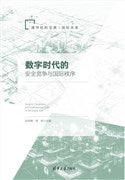Books

Security Competition and International Order in the Digital Era 数字时代的安全竞争与国际秩序
| Author | : | SUN Xuefeng & LI Bin |
| Publication Date | : | Nov / 2023 |
| Publisher | : | Tsinghua University Press |
Security Competition and International Order in the Digital Era” mainly analyzes the strategic competition of great powers and the changes and continuation of international/regional order and their impact mechanisms in the process of entering the digital era. It combines the reality of international relations to reveal the impact of digital technology on national military capabilities and international security. Competition and the shaping and impact of changes in international security norms; on this basis, the strategic choices of countries and their influencing factors in the process of digital technology competition are described and analyzed. “Security Competition and International Order in the Digital Era” puts forward many research findings with theoretical insights and practical significance, mainly including: In the process of entering the digital age, the core of the foreign strategic concerns of major powers is still the strategic threat in physical space, but their decision-making The process has begun to be affected by the dual influence of digital thinking and geopolitical thinking, which has prevented the current China-U.S. and overall international order from falling into a Cold War-style camp confrontation, because digital thinking has effectively downplayed ideological competition in international relations; the United States versus China The containment of digital technology has not yet caused China and the United States to fall into a “new cold war”, and the East Asian security order has also continued the hedging order since the 21st century. The reason is that the system characteristics of East Asia have not yet undergone fundamental changes in the process of entering the digital age, and the U.S. digital technology The difficulty in supporting its capabilities to suppress China’s digital technology has strengthened the motivation of East Asian countries to insist on strategic hedging; the competition for artificial intelligence military applications has different intensity in different fields, but it is difficult to form a decisive advantage, and the objective assessment of the advantages of first movers has It is conducive to the gradual formation of effective ideas for controlling international competition in military artificial intelligence. For example, starting from the perspective of international law compliance, we can consider transforming the principles of proportionality, distinction and proportionality in international law into operations in the early stages of military artificial intelligence design and training. ified logic and algorithms, input or training artificial intelligence programs, etc. “Security Competition and International Order in the Digital Era” focuses on the theoretical thinking and empirical analysis of Chinese scholars on the transformation of the international order, changes in international security and foreign strategic choices in the early digital era. It deepens the theoretical research on international relations in the digital era to a certain extent. At the same time, it has certain inspiration for government departments and multinational enterprises to better understand and adapt to the international political and economic environment in the digital age. It is mainly intended for university teachers, policy analysts, professional students in international relations and related majors, strategic planners/analysts of digital technology multinational enterprises, and other people who pay attention to international relations in the digital era.

